
Venezia Cruises

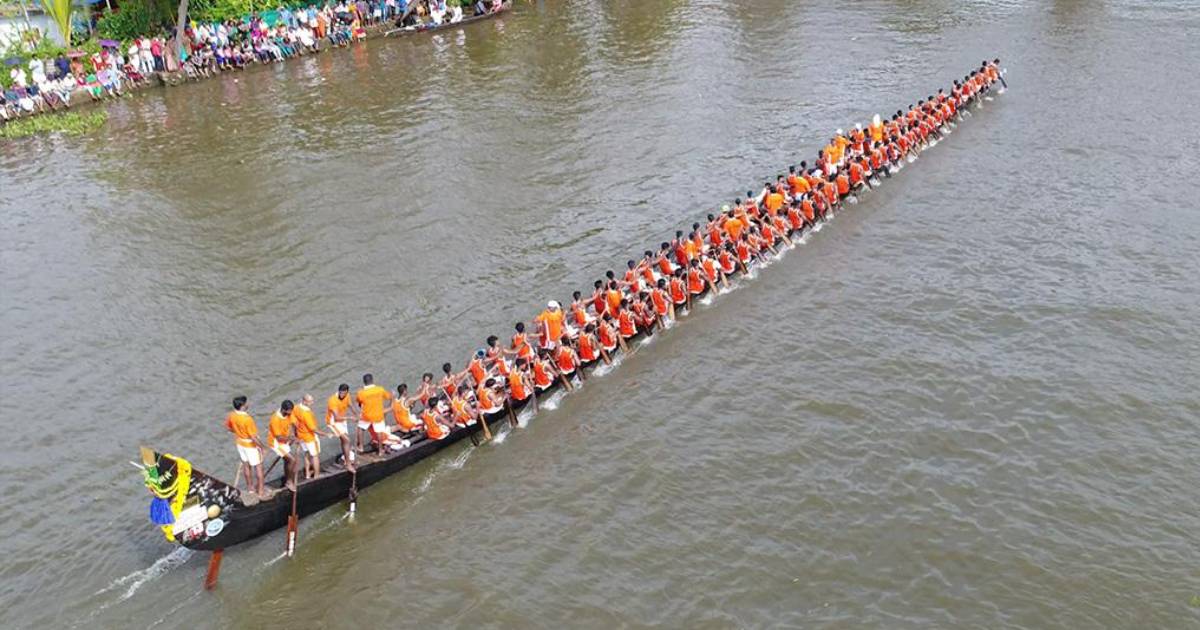
The Champakulam Boat Race, a pivotal event in Kerala’s cultural calendar, marks the commencement of the boat racing season. Held annually on the picturesque Pampa River, this race is not only a sporting spectacle but also a deep-seated tradition that reflects the region’s rich heritage. The 2024 race, conducted on June 22, witnessed a thrilling competition with Ayaparambu Valiya Diwanji emerging victorious and clinching the prestigious Raja Pramukhan Trophy. This victory added another chapter to the long history of this esteemed event, drawing thousands of spectators who gathered to witness the excitement and fervor of Kerala’s oldest snake boat race.
Rooted in history, the Champakulam Boat Race commemorates the installation of the deity at the Ambalappuzha Sree Krishna Temple, a significant event that occurred nearly four centuries ago. The race day begins with traditional rituals, including prayers and offerings, followed by a grand procession of decorated snake boats. The intense competition and the vibrant cultural performances make this event a mesmerizing experience for both locals and tourists. The race not only showcases the athletic prowess of the rowers but also celebrates Kerala’s cultural and spiritual heritage, making it a must-visit event for anyone looking to immerse themselves in the local traditions.
The Champakulam Boat Race, known locally as the “Champakulam Moolam Boat Race,” is a vibrant and storied event that is deeply embedded in Kerala’s cultural and historical fabric. Originating nearly four centuries ago, this race commemorates a significant event in the region’s history: the installation of the deity at the Ambalappuzha Sree Krishna Temple. This historical and religious legacy transforms the race from a mere sporting event into a grand celebration of Kerala’s rich cultural heritage.
The story of the Champakulam Boat Race begins with a tale of devotion and royal decree. Legend has it that the original idol at the Ambalappuzha Sree Krishna Temple was deemed impure. The king of Chembakassery ordered a new idol to be brought from the Karikkulam Parthasarathy Temple. The journey to transport the new idol was arduous, involving a stop at Champakulam, where the king’s men and the idol rested for the night. This historical journey is celebrated annually with the boat race, symbolizing the transport of the deity and the king’s dedication to preserving the sanctity of the temple.
The Champakulam Boat Race is more than just an athletic competition; it is a vivid reenactment of historical events that shaped the region’s cultural identity. Each year, the race begins with a series of traditional rituals and ceremonies. The boats, especially the chundan vallams (snake boats), are ornately decorated, echoing the grandeur of the historical procession. The rowers, who undergo rigorous training, embody the spirit of unity and strength, reflecting the communal effort and devotion that marked the original event.
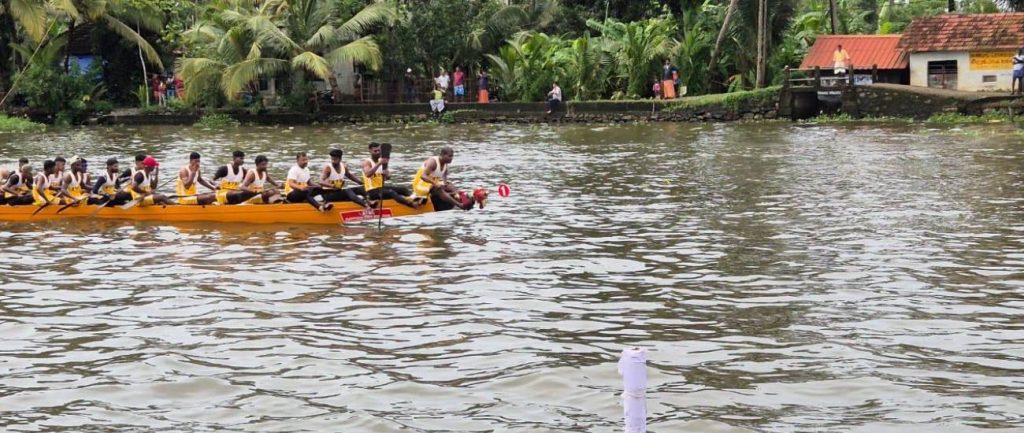
The race symbolizes more than just historical events; it represents the endurance and resilience of the local people. The coordinated efforts of the rowers, the rhythmic beats of the traditional boat songs, and the enthusiastic cheers of the spectators all contribute to a collective sense of pride and identity. The Champakulam Boat Race stands as a testament to the enduring cultural heritage of Kerala, a spectacle that unites the past with the present, and the local community with the broader world.
Over the centuries, the Champakulam Boat Race has evolved from a local celebration to an event of national significance. It now attracts visitors from all over the world, drawn by the unique blend of history, culture, and athleticism. The race has not only preserved its traditional roots but has also adapted to contemporary times, incorporating modern organizational techniques while maintaining its cultural essence.
The Champakulam Boat Race is a captivating blend of history, culture, and community spirit. It is an event where the past meets the present, creating a vibrant celebration that honors the legacy of Kerala’s cultural and historical heritage. As the race continues to draw crowds and captivate hearts, it stands as a symbol of the region’s enduring traditions and communal bonds.
The Champakulam Boat Race, an iconic event in Kerala’s cultural calendar, is much more than a thrilling sporting spectacle. It is a deeply spiritual and communal celebration, steeped in centuries-old traditions and rituals that highlight the region’s rich heritage. Each year, the race kicks off with a series of meticulously observed rituals, setting the stage for a grand display of unity and strength.
The day of the Champakulam Boat Race begins with an air of reverence and anticipation. The early morning is marked by prayers and offerings at the local temples, invoking divine blessings for the safety and success of the participants. These rituals are not mere formalities but deeply rooted practices that underscore the spiritual significance of the event. The temples, adorned with flowers and traditional lamps, become centers of activity as priests and devotees come together to perform these sacred rites.
Following the morning rituals, the atmosphere shifts from solemnity to exuberance with the start of the grand procession. This procession is a visual and auditory feast, featuring various types of boats, each uniquely decorated and manned by enthusiastic rowers. The centerpiece of the procession is the majestic chundan vallams, or snake boats, known for their impressive length and ornate designs. These boats, carrying up to 100 rowers, are a sight to behold as they glide gracefully on the Pampa River, symbolizing strength and solidarity.
The preparation for the Champakulam Boat Race is a rigorous and demanding process, reflecting the dedication and perseverance of the rowers. Training begins weeks in advance, with teams practicing daily to perfect their synchronization and endurance. This training is not just physical but also mental, fostering a spirit of camaraderie and teamwork among the rowers.
The traditional rituals and preparations for the Champakulam Boat Race are rich in symbolism, embodying the cultural and spiritual ethos of Kerala. The prayers and offerings reflect a deep-seated belief in divine intervention, while the grand procession showcases the artistic and communal spirit of the region. The rigorous training, on the other hand, highlights the values of discipline, teamwork, and perseverance.
The Champakulam Boat Race is not just an event; it is a living tradition that brings together history, culture, and community. By enhancing the traditional rituals and preparations with modern elements, the race can continue to captivate and inspire generations to come.
The 2024 edition of the Champakulam Boat Race was a spectacular success, showcasing the rich cultural heritage and competitive spirit of Kerala. Held on June 22, 2024, the race featured 13 formidable snake boats, each vying for the prestigious Raja Pramukhan Trophy. This year’s event was marked by fierce competition and impressive displays of rowing prowess, drawing thousands of spectators from near and far.
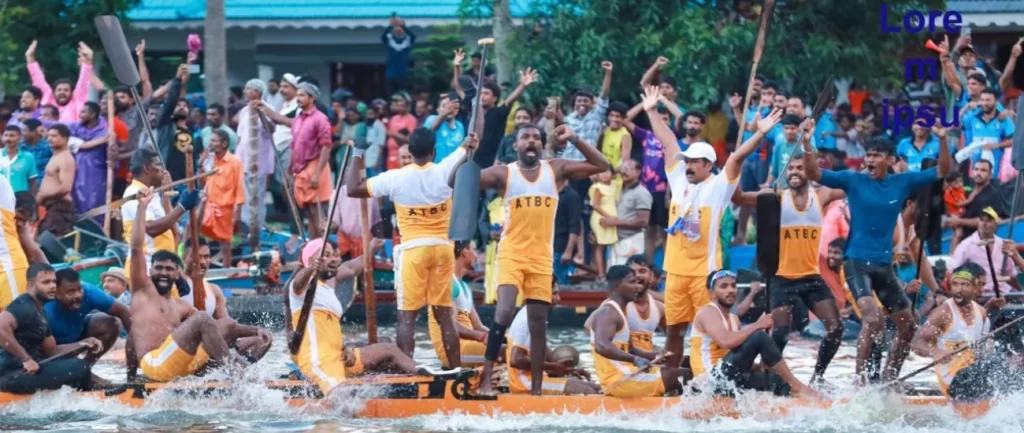
Ayaparambu Valiya Diwanji emerged as the champion of the 2024 Champakulam Boat Race, clinching the coveted Raja Pramukhan Trophy. This victory is a testament to their dedication, rigorous training, and exceptional coordination. The team’s flawless performance was a highlight of the event, earning them the highest honor in this historic race.
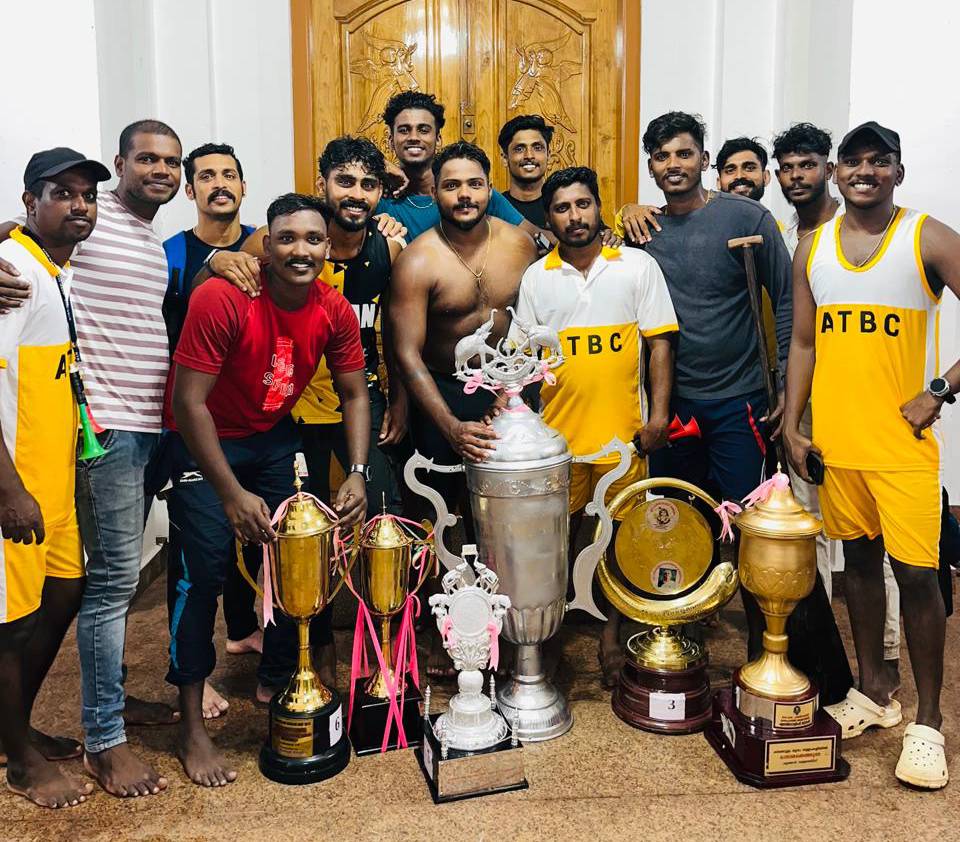
The competition among the 13 participating snake boats was nothing short of electrifying. Each team demonstrated remarkable skill and coordination, making the race a thrilling spectacle. The narrow margins and close finishes kept the spectators on the edge of their seats, showcasing the high level of athleticism and teamwork involved.
While Ayaparambu Valiya Diwanji took home the top prize, the runners-up also put on an impressive performance, highlighting the depth of talent in the competition. The second place was fiercely contested, with the runners-up showing commendable perseverance and skill.
These teams, although not winning the top prize, displayed exceptional skill and sportsmanship, making the event even more memorable.
The 2024 Champakulam Boat Race was not just about the competition; it was a vibrant cultural showcase that highlighted the rich traditions of Kerala. The event drew thousands of spectators, both locals and tourists, who were treated to a festive atmosphere filled with traditional music, dance, and cuisine.
The race day began with traditional rituals and a grand procession, setting the tone for the day’s events. The decorated snake boats, with their vibrant colors and rhythmic rowing, were a sight to behold, adding to the overall splendor of the event.
The 2024 Champakulam Boat Race was a resounding success, marked by fierce competition, cultural richness, and community spirit. Ayaparambu Valiya Diwanji’s victory, along with the impressive performances of all participating teams, highlighted the dedication and skill that define this historic event. As the race continues to evolve and grow, it remains a vibrant celebration of Kerala’s cultural heritage, drawing spectators and participants from around the world.
The Champakulam Boat Race, a highlight of Kerala’s vibrant cultural calendar, typically takes place in June or July. This timing coincides with the Moolam day in the Malayalam month of Mithunam, setting the stage for an event that seamlessly blends tradition with excitement. To fully immerse yourself in this exhilarating experience, planning your visit well in advance is crucial. Here are some tips to make the most of your journey:
Accommodation Planning: Consider booking your stay well in advance, as the event attracts a large number of visitors. Early reservations ensure you have a comfortable place to stay close to the venue.
The Champakulam Boat Race is not just a high-stakes competition; it’s a vibrant cultural festival that captures the essence of Kerala’s rich traditions. The race day is infused with a festive atmosphere, where the local community and visitors come together to celebrate with music, dance, and traditional performances.
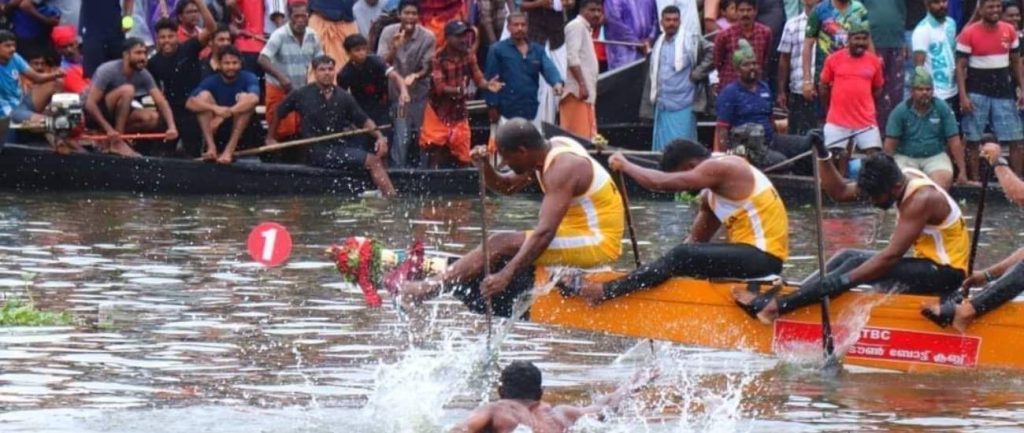
As the boats glide through the Pampa River, the air is filled with the rhythmic beats of traditional boat songs known as Vanchipattu. These songs, sung by the rowers in perfect unison, not only set the rowing pace but also infuse the event with a sense of cultural pride and unity. The beats of the chenda (traditional drum) reverberate through the air, adding to the electrifying atmosphere.
Local artists take center stage with performances of classical dances such as Kathakali and Mohiniyattam, telling stories from Kerala’s folklore and epics. These dances, with their elaborate costumes and expressive gestures, provide a visual feast for the spectators.
The riverbanks come alive with stalls selling local delicacies, handmade crafts, and souvenirs. The aroma of Kerala’s signature dishes, such as appam and stew, fish fry, and banana chips, wafts through the air, enticing visitors to indulge in the local cuisine. The entire village of Champakulam is decorated with colorful lights and flowers, creating a picturesque setting that enhances the overall experience.
Community involvement is a cornerstone of the festivities. Local residents actively participate in organizing the event, ensuring that every visitor feels the warmth of Kerala’s hospitality. The festival fosters a sense of unity and shared cultural pride, making it a memorable experience for all.
The Champakulam Boat Race, a cornerstone of Kerala’s cultural heritage, has a profound impact on the state’s tourism industry. This annual event not only draws spectators from across India but also attracts international visitors, eager to witness the spectacle of snake boats gliding through the serene backwaters. The race’s significance extends far beyond the competition itself, creating a ripple effect that boosts the local economy and promotes Kerala’s rich cultural traditions.
The Champakulam Boat Race serves as a magnet for tourists, turning the quaint village of Champakulam into a bustling hub of activity during the event. Hotels and homestays in and around the area experience a surge in bookings, often reaching full occupancy well before the race day. This influx of visitors creates a vibrant atmosphere, with streets filled with eager spectators, local vendors, and cultural performers.
The economic impact of the Champakulam Boat Race extends to various sectors, from transportation to food services. Tour operators offer special packages that include guided tours, transport, and accommodation, making it convenient for tourists to experience the event. Local artisans and craftsmen also benefit from the increased footfall, as they sell traditional handicrafts and souvenirs to the visitors.
The race acts as a live exhibition of Kerala’s cultural heritage, showcasing traditional boat songs, dance performances, and local cuisine. This cultural immersion is a unique selling point, attracting cultural enthusiasts and researchers. The widespread media coverage and social media buzz around the event further amplify its reach, showcasing Kerala’s traditions to a global audience.
The Champakulam Boat Race fosters a sense of community pride and engagement. Local residents actively participate in organizing and hosting the event, showcasing their hospitality and cultural knowledge. This communal effort not only enhances the visitor experience but also strengthens community bonds and preserves cultural traditions.
The Champakulam Boat Race is more than a sporting event; it is a celebration of Kerala’s cultural heritage that significantly boosts local tourism. By drawing visitors from around the world, it supports the local economy, promotes cultural traditions, and fosters community pride. With strategic improvements, the event can continue to enhance its impact, ensuring that Kerala remains a top destination for cultural tourism.
Following the exhilarating Champakulam Boat Race, the spotlight now turns to the much-anticipated Nehru Trophy Boat Race (NTBR). Set to take place on August 10, 2024, on the tranquil waters of Punnamada Lake in Alappuzha, this event is the pinnacle of Kerala’s boat racing season. Celebrating its 70th edition this year, the Nehru Trophy Boat Race promises an unmatched display of skill, tradition, and cultural pride, drawing enthusiasts and tourists from around the globe.
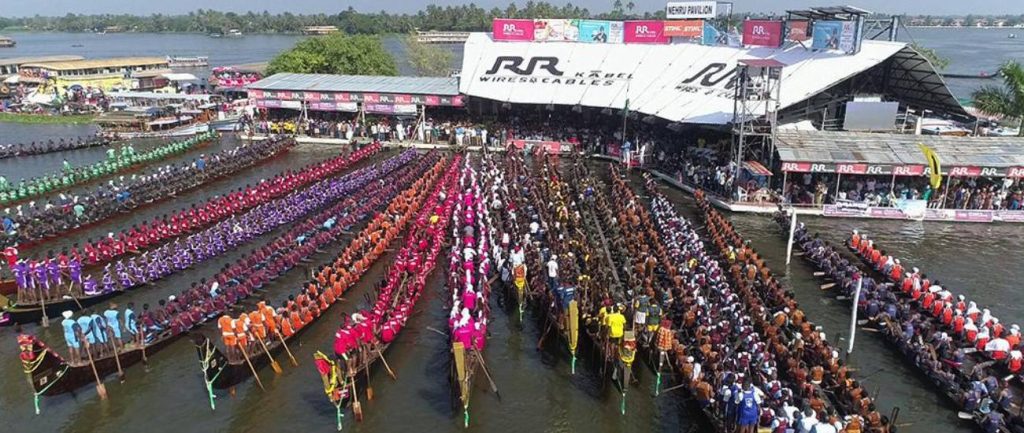
The Nehru Trophy Boat Race holds a unique position as the most prestigious of all Kerala’s boat races. Named in honor of India’s first Prime Minister, Jawaharlal Nehru, who was so impressed by the boat races during his visit to Kerala that he donated a trophy, this event has grown in grandeur and significance over the decades. Teams from various regions prepare meticulously, training for months to ensure they perform their best in this highly competitive race.
The NTBR is renowned for its elaborate and energetic display of snake boats, known locally as chundan vallams. These boats, often measuring over 100 feet in length and manned by more than 100 rowers, cut through the water with precision and power. The synchronized rowing, accompanied by traditional boat songs, creates a mesmerizing spectacle.
The event is not just a race but a cultural festival, showcasing Kerala’s rich traditions through various performances. From Kathakali dance to traditional music and local cuisine, the race day is packed with activities that offer a deep dive into the cultural fabric of Kerala.
Months of preparation culminate in this grand event. Communities rally together to support their teams, creating a vibrant atmosphere of camaraderie and competition. The meticulous training sessions are a testament to the dedication and hard work of the rowers, who strive to uphold the honor and legacy of their respective regions.If you missed the excitement of the Champakulam Boat Race, don’t worry! The upcoming Nehru Trophy Boat Race offers another chance to witness the grandeur of Kerala’s boat racing culture. Contact Venezia Kerala Houseboat today to book your stay and enjoy the races from the comfort of our luxurious houseboats. Make your visit to Kerala an unforgettable experience filled with tradition, excitement, and unparalleled hospitality.